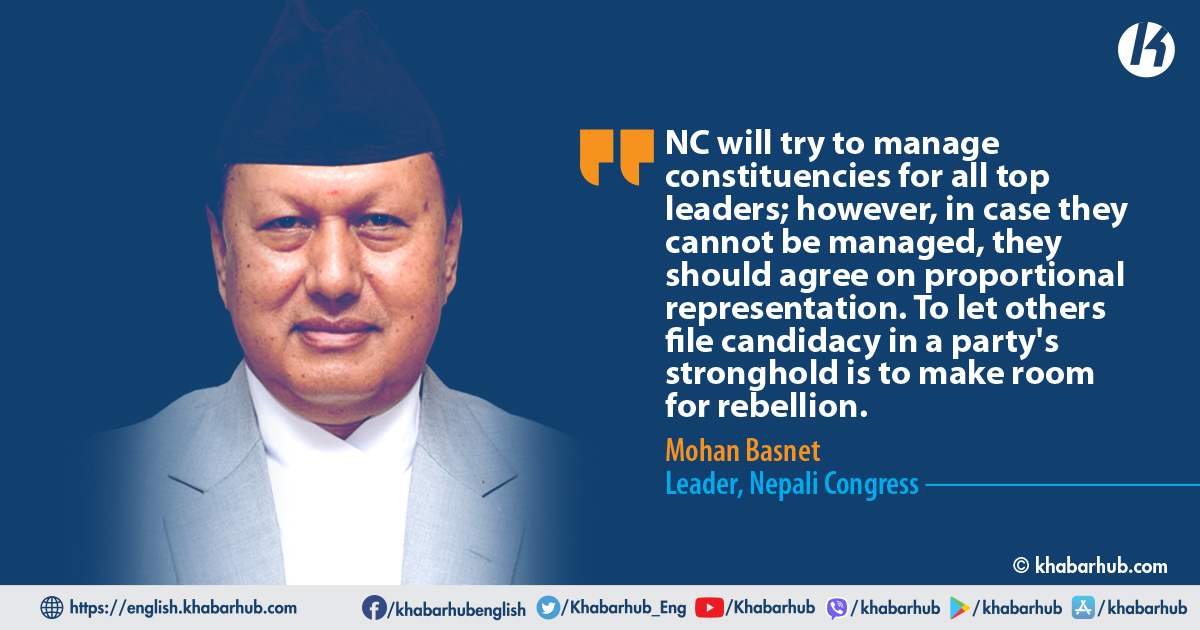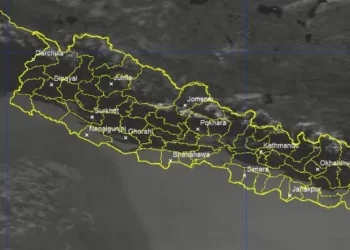KATHMANDU: With the date of the election to the House of Representatives and State Assembly inching closer, people are raising eyebrows, particularly on the issue of the distribution of seats within the ruling coalition.
There are a total of 165 direct constituencies in the House of Representatives. Five parties in the ruling coalition have submitted claims for 233 seats.
In the meeting held a few days ago, Nepali Congress (NC) submitted claims for 100 seats, CPN-Maoist Center for 60, CPN-Unified Socialists for 40, Janata Samajbadi Party (JSP) for 31 and Rastriya Janamorcha for 2.
Khabarhub’s Dhiraj Basnet held a conversation with NC leader Mohan Basnet on contemporary politics and the allocation of seats in the upcoming elections. Excerpts::
How will the parties agree on seat sharing among the ruling parties?
In fact, each party wants more seats in the elections. The parties are working in such a way that they are considering the recently-held local election as a measuring rod.
The parties cannot bring their desired number. The decision will be made based on the current public opinion.
During the distribution of tickets, the pressure increases, and at that time parties will come together and discuss.
Nepali Congress had won only 23 seats in the 2017 elections, but this time it has claimed 100 seats, isn’t it unnatural?
Talking about the first point, NC garnered a majority in the 1990 and 1999 elections to the House of Representatives. Even the Maoist Center became a big party even though it did not get the majority.
UML has also presented itself as a big party but it has not been able to get a majority.
Therefore, the ruling parties will contest the elections by making a common strategy. The communist parties, too, are committed to defeating UML.
However, the coalition cannot go smoothly much longer unless the leftists in the coalition realize this fact.
One should work based on the new mandate, the public opinion of the recent poll is to be considered.
Maoist Center, Unified Socialist, and Madhes-centric parties will also be taken along. Therefore, their top leaders can be reconciled in some places but it is not possible in the constituencies where the NC had won alone.
If a party has a majority in a constituency, another party will not field its candidacy there. If that happens, there will be a lot of rebellion. It is my opinion that it should be found where one is strong.
When Nepali Congress claims 100 seats, how far is it likely to come down for compromise?
The authority to decide on this belongs to the concerned body, but in my personal opinion, NC will not go below 90 seats.
Will you not be in difficulties managing the top leaders?
First, the CPN-UML and Maoist Center had contested as one and won many seats; it is not fair to claim those places as the ones won in a single. They cannot claim UML’s vote as theirs.
Now it is said that, in the coalition, those who have won in the past election will be given those places and there will be seat sharing in the places won by UML. What position will NC be in that case?
If the one who has won is to be given the seats, NC, which had been a big party could contest alone. One has to be realistic. One has to respect people’s sentiments and their choice.
Although UML had got remarkable votes in Doti, the people will not vote for the Unified Socialist. The same is true about many places won by Maoist Center with support from UML.
In my district, in Speaker Agni Sapkota’s constituency, UML got more votes than Maoist Center before, but now they are fighting elections in Sindhupalchowk in coordination with UML.
NC had fought alone and has won 32 of our 54 wards. The Maoist Center has won in only five wards. A party that wins five wards has claimed 32.
As much as possible, we will manage all the leaders. By doing so, those who have strong public support will contest elections and those who are weak will go proportionally.
If there is public support in one place, giving it to another will cause problems. It will not be much good. There will be no problem if you accept the previous weaknesses and move forward.
Do you mean to say if the situation is not easy, if some leaders are imposed on others’ firm hold, there might be a rebellion?
Looking at the results of the last election, it did not look good. The top leaders can best be managed in proportional voting.
Maoist Center and Unified Socialists had formed a coalition before. The votes of UML are not theirs. In some places, the Maoist Center won with the votes of the UML.
Will not the opinion that NC leaders who got defeated before should get a chance to contest, however, the Maoist Center and others have to agree to take proportional voting create problems in the coalition?
NC leaders got defeated due to UML’s stronghold over there. The votes are divided there now. What will be the condition of the Maoist Center when UML votes are withdrawn?
They have to confine themselves to the third position. NC is the first even when others are put together on the next side.
What will happen if the Maoist Center forms an alliance with other parties like the local parties?
One of the principles of the coalition is to form an alliance against UML. We said that the coalition should be among the 5 designated parties; however, in Sunkoshi Rural Municipality, the Maoists Center made a coalition with the UML from the ward level. We did not accept that, yet, we still have two-thirds of the votes.









Comment